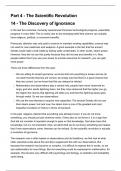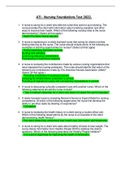Part 4 - The Scientific Revolution
14 - The Discovery of Ignorance
In the last five centuries, humanity experienced immense technological progress, essentially
progress in every field. This is mainly due to the emerging belief that science can actually
have religious, political, or economic benefits.
Previously, attention was only paid to science to maintain existing capabilities; science was
not used for new medicines and weapons. A good example is the fact that the ancient
Greeks could make a ball rotate by boiling water underneath, in other words, steam power.
However, they did not use this purely because they did not see any benefits in it. Now,
people realize that if you use your power to provide resources for research, you can gain
more power.
There are three differences from the past:
1. We are willing to accept ignorance; we know that not everything is known and we do
not claim that the theories are correct; we simply say that there is a good chance that
they are correct, but we know that this can always be refuted.
2. Mathematics and observations play a central role; people have never observed an
angry god who sends lightning down, but they have observed that the higher you go,
the higher the chance that lightning will strike you and that this lightning easily goes
through metal. So we use observations.
3. We use the new theories to acquire new capacities. The ancient Greeks did not use
their steam power, but look now, the steam train is one of the greatest and most
impactful inventions in history in terms of transport.
In the past, religions claimed that everything was already known; if you do not know
something, you should just ask someone wiser; if they also do not know it, it is a sign that
God did not consider it important enough to pass on that knowledge. God does have that
knowledge, but it is not important. Now, we admit that we do not know something and realize
that if new observations come, theories can be refuted. So the scientific revolution is actually
a revolution of ignorance.
The research now is often based on observations and old traditions; we first look at what
older scientists wrote about this and then supplement this with our observations. But
because the research has become so complex, it is difficult to express this in words, so we
use mathematics for most things. But not everything could be expressed in mathematics, for
example, this became very difficult with psychology and biology, so statistics and probability
came along.
, People in the past did not think that more research could give them more power. Rome was
not so successful because of their better technology, but purely because of their iron
discipline and organization. Napoleon's army hardly differed from Louis XIV's army and put
Constantine the Great's army against that of Charlemagne and Constantine the Great might
still win. Compare this with now, where WWII was decided by scientific research. America
had two choices, to invade Japan, which would have lasted until 1946, or to stop the war via
scientific research in two weeks and two atomic bombs.
They not only thought that research could not give them extra power, they also thought that
the world could not be improved. It used to be better and they can only try to keep it as it
used to be. When people realized that they can improve the world, a whole world opened
up. World problems that are not the inevitable fate of humanity, but just the fruits of our
ignorance and through hypotheses and research, scientists could design a lightning rod
instead of explaining it by an angry god who throws lightning down.
Many world problems are slowly being solved, but an important problem that has still not
been solved is death. You were declared mad if you thought you could fight death in the
past. Death was the reason you lived and you could not escape it. But look at the progress
and avoiding death could become a reality soon. If you got an arrow in your shoulder, this
could mean your death, while now this is a minor procedure. Things that used to mean
death, we can now fight, for example, cancer and heart failure.
People often think that science is just a matter of time and that with enough subsidies
everything can be found, but that is a problem. There are not enough subsidies because the
more complicated the research, the more money it costs. So governments make choices
based on what is most important and what can bring benefits on an economic, religious, or
political level.
15 - The Marriage of Science and Empire
In Europe, there was a strong link between imperialism and science. This resulted in
expeditions, which may have been beneficial to the Europeans, but not so beneficial to the
locals. Whether those expeditions are for imperialist purposes with some scientists on board,
or whether they are scientific expeditions with some imperialist purposes that is asking as if
a jug is half empty or half full. Basically it's for both, one no more or less, but that depends
on the moment.
When Britain colonized much of Oceania, the local peoples suffered hard, partly because of
the exploitation and forced labor in Tasmania, for example, in no time at all, the entire
Tasmanian population was wiped out.
Why was Oceania colonized by Europe, and here Britain, and not by say Japan and China,
which is much closer? In terms of technology, China was perhaps even further ahead;
Columbus' ships were nothing compared to Zhen He's ships. The fact that China and the






